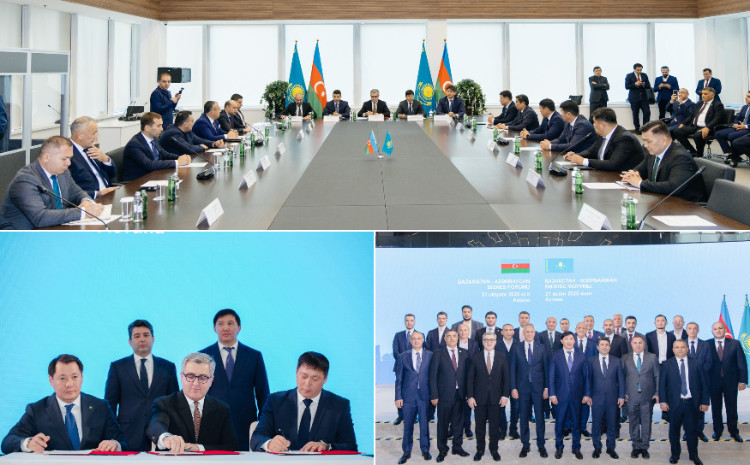 https://www.innews.az/uploads/news/2025-10/_innews_f73ccf3840807b22a8a534b75_o.jpg
https://www.innews.az/uploads/news/2025-10/_innews_f73ccf3840807b22a8a534b75_o.jpg
As part of the state visit of President of the Republic of Azerbaijan Ilham Aliyev to Kazakhstan, a Kazakh-Azerbaijani business forum titled “Kazakhstan–Azerbaijan: Economic Cooperation in the Era of Artificial Intelligence and Industrial Initiatives” was held in Astana, initiated by the Embassy of the Republic of Kazakhstan in Azerbaijan.
The event brought together representatives of government agencies and the business communities of both countries, including more than 100 companies operating in such sectors as trade, logistics, industry, IT, transport, agriculture, construction, energy, tourism, and education.
Opening remarks were delivered by Vice Minister of Trade and Integration of Kazakhstan A. Abildabekov and Deputy Minister of Economy of Azerbaijan A. Akhundov.
Other speakers included Chairman of the Board of “NC KAZAKH INVEST” S. Kynzhakulov, Director General of “QazTrade” A. Aldazharov, Executive Director of the Export and Investment Promotion Agency “AZPROMO” Y. Abdullayev, Chairman of the Small and Medium Business Development Agency “KOBIA” O. Mammadov, Chairman of the Board of the “Damu” Fund F. Sarsekeev, and others.
The discussions focused on strengthening trade and economic ties, enhancing investment cooperation, developing transport and logistics infrastructure, digitalization, the use of artificial intelligence, and the creation of joint projects in high technologies and educational programs, among other important areas of partnership.
The event also featured B2B and B2C meetings between representatives of the two countries.
As part of the forum, the 3rd Meeting of the Kazakhstan–Azerbaijan Business Council was held under the theme “Deepening Economic Cooperation and New Horizons of Partnership.”
From the Azerbaijani side, speakers included Yusif Abdullayev, Executive Director of AZPROMO; Orkhan Mammadov, Chairman of the Board of KOBIA; and Elchin Sadig, Co-Chair of the Azerbaijani side of the Business Council.
The Kazakh side was represented by Marat Karimssakov, Chairman of the Foreign Trade Chamber of Kazakhstan, and Daniyar Bimov, Co-Chair of the Kazakh side of the Council.
During the event, Ambassador of Kazakhstan to Azerbaijan Alim Bayel presented letters of appreciation to 14 companies from both countries for their contribution to the development of bilateral business relations.
In total, 16 agreements and memorandums of cooperation were signed between Kazakhstan and Azerbaijan in areas such as industry, tourism, education, digital technologies, and logistics. Twelve of these documents were initiated by the Embassy of Kazakhstan in Azerbaijan.
Among them are memorandums on the construction of the “Alakol” health and wellness complex, the production of modern energy-efficient lighting devices in Almaty, cooperation in the field of educational solutions, production and sale of children's clothing, the creation of a Heydar Aliyev classroom in one of the Kazakh schools, and an agreement on the implementation of the “SME House” project in Astana.
Additionally, during the business forum, the Kazakh company “Qalan”, which provides educational services through an online mathematics platform, and the Azerbaijani company “SAIRS”, specializing in water flow and irrigation monitoring technologies, presented their projects to Presidents Kassym-Jomart Tokayev and Ilham Aliyev.
During the presentation, “Qalan” expressed its readiness to offer its educational services free of charge to schools in the Karabakh region, adapting them to Azerbaijan’s educational system.
The state visit of President Ilham Aliyev, accompanied by the business forum and an extensive business program, marked a significant milestone in the development of the strategic partnership between the two brotherly nations.
President of Kazakhstan Kassym-Jomart Tokayev emphasized the importance of the business forum for strengthening bilateral relations.
The signed agreements, the active participation of the business community, and the concrete steps toward implementing investment and infrastructure projects demonstrate the transition of bilateral cooperation to a new qualitative stage — one based not only on historical friendship but also on deep economic partnership.
